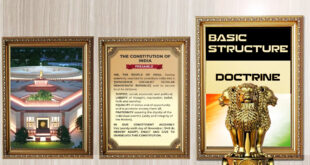The global investor on the coming general election, the anti-incumbency trend and why he thinks the Indian state is socialist In his latest book, ‘Democracy on the Road: A 25 Year Journey Through India’, investor Ruchir Sharma has catalogued the 27 national and State elections that he has tracked over a quarter of a century in his personal capacity. Mr. Sharma, who is the head of emerging markets and chief global strategist at Morgan Stanley Investment Management, discusses the 2019 general election, explains why India has the highest anti-incumbency rate among major democracies and why it can never be a China on economic reforms. Excerpts: There is a thread running through your book about India’s “deep distaste for incumbents”. Do you mean Indians instinctively throw out governments, whatever their record? The word anti-incumbency was coined in India. When I write for The New York Times or such publications, and I use the phrase, they don’t know what I’m talking about because the phrase was coined here. That’s because India has the highest rate of anti-incumbency among major democracies in the world. In the U.S. and the U.K., most incumbents tend to get re-elected. In the U.S., for example, two-thirds of Presidents and Governors who stand get re-elected; in India, two-thirds lose their elections. That’s what the data say. There are two or three reasons why this happens. The foremost is that the state in India is broken. Politicians want to do stuff and promise stuff, but the state is just broken and cannot deliver. It just falls through the cracks. For example, yesterday, I was in Bijnor [Uttar Pradesh], and before the District Magistrate’s office, a big protest broke out by sugar cane farmers over the question of dues. The whole issue is that you can keep announcing things, like minimum support price, but the moment you take your payment slip to the Food Corporation of India, they give you the runaround. The mechanism is so broken that your daily interaction with the government is very frustrating and possibly the only thing you can do is vote people out. Secondly, it doesn’t take much to vote people out because of the fragmented polity. In most States in India, you can win most seats by securing 30% of the vote share, so then just a 3-4% vote swing is enough to change the fortunes of a government, or if the Opposition comes together, it can change things. These are factors that distinguish India from other countries. There have been many instances of governments being voted back. How do you explain that? Again, there are a couple of things. There was a period of time, between 2005 and 2010, when a lot of incumbents won elections in India. A couple of things happened in that period. One, the economy was booming and inflation was fairly low, and two, because the economy was booming there was a lot of welfare that could be done, as governments were able to spend on these programmes. This really helped those governments come back to power. Having said that, one of the more insightful statements which I have repeated twice in the book is by a Mangaluru MLA, U.T. Khader, who said that winning elections in India is like fighting a battery of six tests with a minimum passing mark on each. You can’t rely on just one factor — if you don’t do enough welfarism, you will lose; you have to get the caste arithmetic and religious politics right; or some huge allegation of corruption hits you. In American politics, there is a far more obvious connection between economics and politics. That argument appears simplistic in the Indian context.
Check Also
Joint Parliamentary Committees (JPCs): Scrutinizing the Executive
Introduction In a parliamentary democracy, ensuring accountability of the executive is paramount. Joint Parliamentary Committees …
 Chinmaya IAS Academy – Current Affairs Chinmaya IAS Academy – Current Affairs
Chinmaya IAS Academy – Current Affairs Chinmaya IAS Academy – Current Affairs



